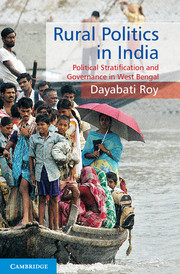Book contents
- Frontmatter
- Contents
- List of Tables
- List of Abbreviations
- Acknowledgements
- 1 Introduction
- 2 Land, Development and Politics in West Bengal
- 3 Changing Landscape of Two Villages in West Bengal
- 4 Seeing the State and Governance in the Grassroots
- 5 Party and Politics at the Margin
- 6 A Narrative of Peasant Resistance: Land, Party and the State
- 7 Caste and Power in Rural context
- 8 Women and Caste: In Struggle and in Governance
- 9 Conclusion: A New Kind of Peasant Mobilization?
- Glossary
- References
- Index
5 - Party and Politics at the Margin
Published online by Cambridge University Press: 05 January 2014
- Frontmatter
- Contents
- List of Tables
- List of Abbreviations
- Acknowledgements
- 1 Introduction
- 2 Land, Development and Politics in West Bengal
- 3 Changing Landscape of Two Villages in West Bengal
- 4 Seeing the State and Governance in the Grassroots
- 5 Party and Politics at the Margin
- 6 A Narrative of Peasant Resistance: Land, Party and the State
- 7 Caste and Power in Rural context
- 8 Women and Caste: In Struggle and in Governance
- 9 Conclusion: A New Kind of Peasant Mobilization?
- Glossary
- References
- Index
Summary
The political processes in post-colonial India have come a long way, bringing about many changes in the relationship between the rural people and the state-led politics. Te state-led politics, that is, organized ‘elite’ domain, and the politics of the rural masses have got entangled in ever-increasing ways in the post-colonial period in India, particularly in post-1977 West Bengal that has witnessed a long uninterrupted rule till 2011 by the Left Front government. The influence of the state and political parties on the everyday lives of common people, particularly of the rural masses, has enormously increased in more recent times due to the ‘successful’ implementation of the PRIs, including the reservation of panchayat seats for the SC, ST and women, the six-monthly gram sansad meetings and increasing allotment of funds and welfare schemes through the panchayat. The contemporary political processes in rural West Bengal can be studied by paying attention to both the panchayat and the party as two institutions of political power. But over and above, political parties seem to be dominating the social and political lives of the rural people in West Bengal more than the panchayats. This largely corroborates with the observation of Bhattacharya (1998) that the panchayats in West Bengal have become another centre for party power, of which the party is well aware, but could not do without it.
- Type
- Chapter
- Information
- Rural Politics in IndiaPolitical Stratification and Governance in West Bengal, pp. 107 - 155Publisher: Cambridge University PressPrint publication year: 2013



